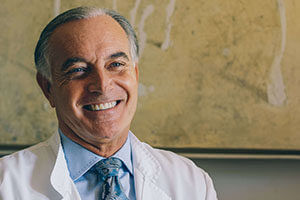ORGANIC FOOD
Is organic food really healthier than conventional products?
We often hear this question, and it is certainly a legitimate one – after all, organic products are generally more expensive than conventionally farmed food. The higher price is often justified by the benefits for consumers, the environment and the farmers themselves.
To come straight to the point: Yes, most organically grown food is better for our health and superior to food produced by conventional means, but there are differences, some of them considerable, as Dr. Robin Mesnage knows. The experienced toxicologist and molecular biologist is part of the research team at Buchinger Wilhelmi and is conducting several studies on the gut microbiome. It is therefore worth taking a more differentiated look at the topic with him.
What speaks in favour of buying organic products?
If you want to buy organic food, whether in a supermarket, a wholefood shop, or an organic farm shop, there are normally many different organic products to choose from: fruit and vegetables sold loosely in bulk, as well as packaged products, boxes with muesli, bars and all kinds of convenience foods. Is it all healthy, just because it is organic?
Take an apple, for example: An organic apple that comes from a local farm that grows crops ecologically has more vitamins and other micronutrients than an apple that is grown conventionally. In addition, it is not contaminated with residues from chemical pesticides, or only to a minimal extent, as spot checks repeatedly confirm. This is important, because pesticides used in conventional farming can potentially be damaging to our health, especially for vulnerable populations like pregnant women and infants. Many pesticides accumulate in the fatty tissue of animals and humans, and are also often found in samples of breast milk. The more frequently you eat such chemically contaminated products, the greater the risk for your health.

Organic fruit from a farm usually is given more time to grow and is picked ripe – a major advantage, because ripe fruit not only tastes better, it also supplies you with more vitamins, polyphenols and other plant substances that are good for your health. Unfortunately, this does not apply indiscriminately to all organic fruit, because large supermarket chains have naturally caught on to the fact that they can set higher prices and therefore earn more money with organic fruit. As a result, they have begun to invest in globalising and industrialising organic food production.
Organic food: What you need to know at a glance
- The term “organic food” covers both unprocessed, organically grown food (e.g., fresh fruit) and more or less highly processed products (e.g., convenience food)
- Organically grown fruit and vegetables contain more vitamins and secondary plant substances, and are less contaminated
- Pesticides and herbicides bear health risks above all for susceptible people
- Organic food from local farms has more nutrients and vital substances than organic products that have been transported from the other side of the globe
- Supermarkets can achieve higher profit margins with organic products.
Ultra-processed food: Why “organic” is not automatically healthy
All kinds of organic foods can be found in supermarkets today, including numerous convenience products and food that has been transported long distances. A study of French supermarkets showed that half of the organic products sold there fall into the “ultra-processed” category. That means that the food has been changed by heat or other processes and contains additives like sugar, sweeteners, salt, fats, colourants, emulsifiers, stabilisers, preservatives, flavour enhancers and artificial aromas. The more processed they are, the longer the list of ingredients, and the more urgent the question, whether these products can justifiably be labelled as “organic”.
However, an even more serious aspect, as studies have shown, is that consuming lots of ultra-processed food is associated with considerable health risks. For example, several studies conducted by the team of Dr. Benoit Chassaing in France came to the result that the contents of ultra-processed food can damage the gut microbiome, irritate the mucous membranes, and promote inflammation. Highly processed products encourage weight gain, and some additives are linked to cardiovascular diseases and cancer.
In short, we are well-advised to avoid ultra-processed food, even it is labelled organic. If you want to stay healthy, choose “good” organic produce, in other words food that is left untreated if possible, or only processed to a small degree, ideally from your region. That is the best way to invest in a long, healthy life.
Ultra-processed food: What you need to know at a glance
- Ultra-processed products can contain many additives, some of which are damaging to your health
- Ultra-processed food can damage the intestinal flora, irritate the mucous membranes, promote inflammation, and encourage obesity and several diseases
- It is not good to buy ultra-processed food, even it is labelled organic
- Even in the organic segment, it is important to avoid junk food that contains few nutrients, but lots of calories as well as fat, sugar or salt
What does science have to say about the health advantages of organic food
The findings by nutritional scientists on the effects on our health of a diet based on organically grown food are still inconclusive. That is mainly because most research carried out so far is in the form of epidemiological studies. That means asking a large number of people whether they consume organic food very often, often, rarely or never, and then trying to determine the subjects’ state of health. The major drawback of these studies is that the results are distorted considerably by other factors, because people who tend to buy organic food generally have a higher income and are better educated, smoke less and do more sport. In other words, they are presumably healthier because they cultivate a healthier lifestyle overall, and not just because they eat organic food.
At King’s College London, Dr. Robin Mesnage has conducted research on this topic together with Prof. Timothy Spector as part of a cohort study of twins. The subjects were pairs of twins, one of whom ate organic food and the other conventionally grown produce. The participants completed a questionnaire, and their state of health was established by examining their gut microbiome and pesticide contamination, among other things. The study determined various effects of pesticide residues on the gut microbiome, but the most interesting result was that the participants obviously found it difficult to answer the question about their consumption of organic food. Several subjects who initially said they ate organic food answered “no” to the same question one month later.
This shows the problems of such studies and means that study design needs to be more complex. Clinical intervention trials would be ideal in which subjects who eat organic food are first observed and examined, then they are put on a conventional diet for a length of time and examined again. Such studies are lacking to date. Yet we can still derive some recommendations from the findings so far.
Recommendations for a healthy diet
🍏 Vegetables, fruit and nuts
Eat as much vegetables, fruit and nuts as possible – these are healthy, nutritious foods that can be produced ecologically.
🌍 Product origin
Pay attention to the origins of products: Food that has been transported long distances, whether organic or not, usually not only has fewer vitamins and other micronutrients, because they have been harvested before they ripen; it also causes more greenhouse gas emissions and other environmental damage compared to locally grown produce.
⚙️ Level of processing
Choose food that has not been processed at all, or only a little. The higher the degree of processing, the greater the risk of a negative impact on your health. Read the list of ingredients carefully: If it includes several chemical substances and terms that you do not understand, you should maybe not buy this product. For example, the term “aroma” can cover countless artificially produced aromas. Several “sweeteners” are suspected of changing the intestinal flora, a “flavour enhancer” like glutamate can trigger headaches (“Chinese restaurant syndrome”), and many E numbers for approved food additives include problematic preservatives or artificial colourants that can be harmful if eaten regularly or if you have intolerances.
🥗 Food diversity
It is equally important to eat in moderation and as varied a diet as possible. You can do this by incorporating different kinds of fruit, vegetables, wheat and pulses in your diet. Try out food you do not know and new recipes. That is fun to do and expands your culinary horizons.
🧾 Organic label
When navigating the maze of organic labels, it is best to choose those that set the highest standards, because an organic label does not always mean that you get a product that is actually good for your health. Demeter certification is one of the organic labels with the strictest quality standards. It guarantees that the product has been grown according to biodynamic principles without chemical pesticides or artificial fertiliser. Demeter-certified farms are also subject to high ethical standards regarding animal farming and the treatment of employees.
Video on the topic “Organic Food”
At Buchinger Wilhelmi, we use high-quality, locally grown ingredients as a matter of course. That is why we have long sourced our food exclusively from organically certified farms. Furthermore, in 2019 we were the first clinic worldwide to have our cuisine certified according to the Demeter standard, and we have been certified as a Bioland partner since 2021. Also learn more about our ARF project in Marbella!
This might also interest you:









